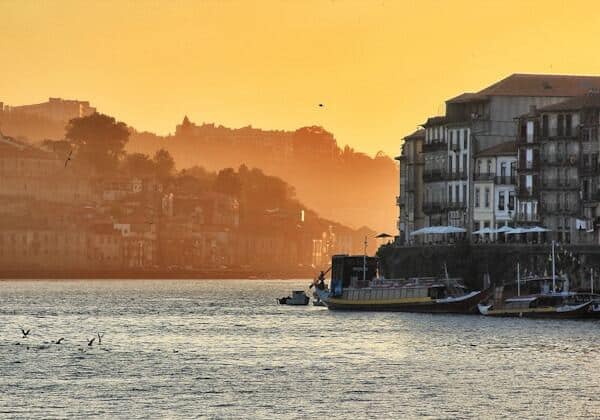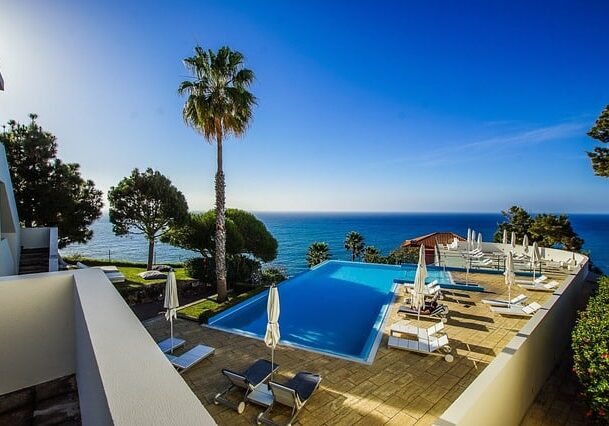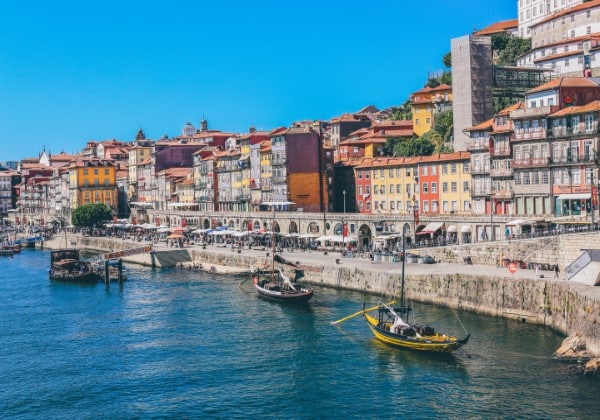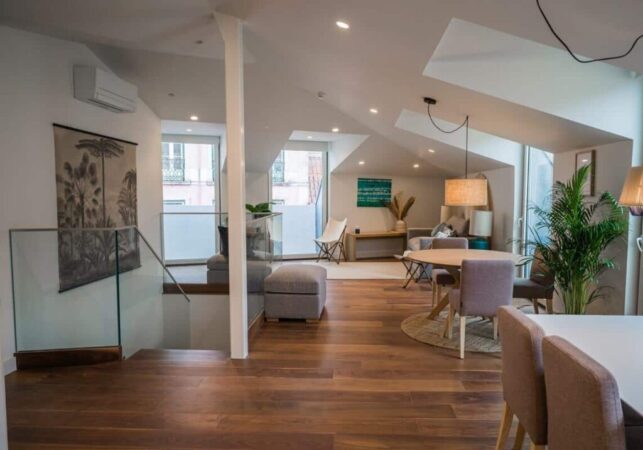Updated: July 1, 2025
Portugal is a hotspot for international property investors. And what’s not to love? Sun. Sea. Views. Stunning property types. High returns. It’s an investor’s dream!
The market offers exceptional value and attractive returns on Portugal real estate investment. Property values in Portugal have skyrocketed by 113 percent between 2010 and 2024—way ahead of the EU average, according to Eurostat. This highlights just how strong of a long-term investment buying property in Portugal can be.
Portugal also places no restrictions on foreign buyers looking to purchase property. And with a wide selection of options to obtain residency, the country makes real estate investing in Portugal and relocation a breeze.
This guide offers insights into Portugal’s property market. We will explore why property buyers choose to invest in Portugal as well as highlight property values, current rental yields, and important information to know about residency and taxes.
Why are investors so interested in Portugal?

Portugal’s affordability compared to other Western European countries and its quality of life continue to attract foreign investors, particularly from North America and Europe.
Portugal combines these financial advantages with a desirable lifestyle, making the country attractive to foreign investors.
The Portuguese real estate market intelligence unit, Confidencial Imobiliario, revealed that the market has ended the 2024 financial year with a 27.2 percent increase in yearly sales.
The increasing demand for real estate, in conjunction with the consistent growth in demand in the tourism sector, has seen real estate prices in key Portuguese cities rise steadily over the past few years. Although speculated, data suggests that Portugal is not experiencing a speculative bubble, and property prices are not overvalued despite its steady growth, which reduces the risk of significant price corrections.
As the Secretary of State for Tourism predicts a further 9 percent growth in the tourism sector in 2025, growth within the property market is expected to follow.
Portugal ranks as the seventh safest country in the world, according to the 2024 Global Peace Index. It boasts political and economic stability, a low crime rate, and a welcoming environment for investors.
With a residence permit in Portugal, investors can also enjoy being a legal Portuguese resident, travel visa-free in the Schengen Area, and live anywhere in Portugal, whether you choose to opt for a beautiful historic townhouse in Porto, a charming beach house by the coast, or even a luxury resort in one of the Algarve’s most sought after postcodes.
An Overview of the Portuguese Real Estate Market
Portugal’s real estate market presents both opportunities and challenges for investors in 2025. While the market has seen strong growth and is attractive to foreign buyers, there are also factors like increased property prices and recent changes to the Golden Visa program that investors should consider.
Portugal’s real estate market has been experiencing a boom, with prices and transactions increasing, and high demand in key locations like Lisbon, Porto, and the Algarve.
Over the past five years, Portugal house prices have seen a sharper increase, driven by growing demand. Factors contributing to this include an influx of expats seeking a better quality of life, a rising number of tourists picking Portugal as their holiday destination of choice, and a boom in the tech scene in Lisbon, Porto, Braga. and other key cities.
For example, Web Summit, one of the largest tech festivals in the world, moved to Lisbon in 2016, and this, coupled with government incentives, signals the appeal of Portugal for startups and tech firms. Despite the recent growth in the Portuguese property market, property prices in Lisbon are still generally lower than in other capitals in Western Europe.
Key property trends in Portugal in 2025 reflect a continued strengthening after the recession and financial crisis, with demand surpassing supply, especially in major cities. Investments are evident in the renovation of old buildings, the construction of apartments and commercial real estate, and the growth of new hotels, providing ample opportunities for investors.
In 2025 and beyond, the Portuguese economy is expected to continue this momentum. While Portugal’s interest rates started off relatively high in 2024, the past year has seen a steady decrease, leading to more favorable market conditions. This is expected to continue as the year progresses.
Average house prices in Portugal
In Lisbon City, properties had an average asking price of €6,934 per square meter in 2024, while it was €4,935 for the Lisbon Metropolitan Area.
Although Lisbon is a popular choice among investors, sunny Algarve real estate investment also presents a lucrative investment opportunity, with a lot of variety on offer across the entire region.
The average asking price (per square meter) for a property in Portimão was €3,272, while property in the Algarve capital of Faro was priced at €3,701 and €5,066 in Lagos, in the Western Algarve. You can also find land for sale in the Algarve that can be more affordable than buying a new place.
The northern Portuguese city of Porto, the second largest city in the country, has enjoyed a tourism boom in recent years and is less expensive than Lisbon. The average asking price for property in Porto City is €4,883, while for the Porto Metropolitan Area, the price is €3,937 per square meter. A Porto real estate investment can be a smart and profitable move.
Price comparison: Cost of a three-bedroom apartment in Portugal
In the interest of comparison, here is what you could expect to pay when buying a modern three-bedroom apartment of a similar size (around 200 square meters) in different locations in Portugal. Note: These are not the cheapest nor the most expensive properties for sale per location, and prices will vary within these areas according to the condition, size, and amenities of the property:
Lisbon | Porto | Cascais | Portimão |
€1,320,000 | €870,000 | €1,695,000 | €449,500 |
From city apartments in Lisbon and Porto to coastal villas in the Algarve, Portugal offers a wide range of investment options to cater to investors’ needs and remains largely affordable compared with other European countries. Prices will also depend on the neighborhood. For example, in Lisbon, Avenida da Liberdade, Príncipe Real, Campo do Ourique, are some of the neighborhoods that command higher prices.
How the residential property price index is growing in Portugal
Residential properties in Portugal continue to appreciate at a faster rate than the rest of the European Union over time, proving that purchasing real estate in the country is a sound long-term investment decision. According to CEIC, which delivers data-driven critical insights on global property markets, Portuguese house prices grew 9.8 percent YoY in September 2024. This trend has continued into 2025.
Why now might be the best time for investing in Portugal real estate
There’s no denying that the steady increase in housing prices could make investors hesitant about Portugal’s property investment right now. However, it’s useful to remember that Portugal’s property market is still on an upward trend, which is expected to continue in 2025.
The latest research by Property Market-Index predicts that the Portuguese property market is expected to grow by 5.8 percent this year, outpacing the broader European Union. So, when it comes to real estate investing, Portugal should be on your radar, as now is still a lucrative time to invest.
Some popular real estate investment opportunities in Portugal are:
- Buy-to-let properties: High rental demand in major cities like Lisbon, Porto, and tourist hotspots like the Algarve makes rental properties highly profitable.
- Renovation projects: Restoring older properties, particularly in historic districts, can offer significant returns, especially with tax incentives for urban rehabilitation.
- Luxury and holiday homes: High-end residential properties in coastal regions remain in demand from international buyers seeking second homes or vacation rentals.
- Commercial real estate: Investing in office spaces, retail units, or hospitality properties can yield strong returns, particularly in Portugal’s growing business hubs.
- Student rentals: Student rental properties can provide consistent income in university areas like Coimbra and Braga.
- Short-term rentals: Popular tourist destinations like Lisbon, Porto, and the Algarve offer strong potential for short-term rental income, although some of the popular cities are experiencing certain restrictions on the issuing of short-term rental licenses.
Portugal Property Investment: Which Areas to Invest In
The property market in Portugal is dynamic and diverse, with many potential locations depending on what you are looking for. Lisbon offers the best of a European capital city, with very appealing property investment opportunities across the city. Lisbon has a higher price bracket compared to the rest of the country. However, the capital remains relatively affordable when compared to other Western European cities.
A Lisbon real estate investment in luxury property could yield significant returns, with capital appreciation in luxury properties expected to grow by 4.5 percent this year, surpassing cities in Europe such as Geneva, Monaca, and Paris.
Neighboring Lisbon, Cascais, and Sintra also provide excellent real estate investment opportunities. For lifestyle buyers and investors seeking out luxury property by the coast, a Cascais real estate investment can provide exceptional returns. Sintra is steeped in authentic Portuguese tradition, filled with colorful palaces and extravagant properties offering unique charm.
Portugal’s ultimate tourist and luxury property destination, the Algarve, has grown in demand while Porto attracts visitors and investors with its rich cultural history and beautiful properties for sale at an affordable rate. For a taste of luxury, Comporta, the Tróia Peninsula, and Melides offer exclusive tranquility. The southwest of Portugal is also expected to explode in the next few years.
Rental yields in Portugal

The booming tourism sector has significantly increased demand for short-term rentals, particularly in Lisbon and in the Algarve, a trend expected to grow even further this year. With restrictions on new Alojamento Local (AL) licenses—essential for short-term rentals—easing since last year, real estate returns in Portugal remain higher than in many other European countries.
The Portuguese government has also played a key role in fostering a thriving real estate market, implementing policies that encourage investment. From diverse property options to high rental yields and the potential for capital appreciation, Portugal offers an attractive landscape for both short- and long-term rental property investors.
The table below highlights rental yields in key regions across the country.
Region | Rental Yield Percentage (%) |
Lisbon Metropolitan Area | 6.8 |
Porto Metropolitan Area | 6.6 |
Silver Coast | Around 5.8 to 6.2 |
Algarve | 5.6 |
Cascais | 5.5 |
Sintra | 6.8 |
Long-term Versus Short-term Rentals in Portugal
Both long and short-term real estate rentals in Portugal provide good returns. There are different advantages to each option, and you should consider carefully which is the best for you.
Short-term real estate rental in Portugal
The Alojamento Local (AL) License is required for investors looking to rent out their property in Portugal for short-stay rentals. While the Mais Habitação law was in effect, it suspended the issuing of new licenses in popular tourist areas that included Lisbon, the Algarve and Porto, making it difficult for investors to capitalize on the tourism boom through short-term rentals.
Fortunately for property investors, many of these restrictions have been rolled back, which should ease the process of acquiring the license going forward. Now, each municipality has the authority to approve regulations in their territory. So, it is important that you check this beforehand if you are looking to buy real estate for this purpose.
Our comprehensive guide to the Alojamento Local (AL) License offers more information. Here are the benefits and drawbacks of short-term renting.
Pros
- Higher rental yield: Short-term rentals in Portugal offer the opportunity for higher returns for investors, particularly with the growing popularity of booking websites such as Airbnb and booking.com. There are also many property management companies in Portugal that can handle the property on your behalf.
- Personal use: If you would like to use the property yourself, short-term rentals give you the flexibility to stay when you like.
Cons
- More hassle: Short-term rental typically requires more involvement on behalf of the property owners. It is also imperative that you find a good management company to handle the property.
- Short-term rental restrictions: As mentioned, legislation previously placed restrictions on the issuing of short-term rental licenses in some areas of Portugal, but these restrictions have eased since the end of 2024.
Long-term real estate rental in Portugal
Let’s go over the benefits and considerations of long-term real estate rental in Portugal.
Pros
- Certainty of fixed income: Long-term rental contracts in Portugal last a minimum of 12 months, which means that you are guaranteed rental income.
- Less damage to property: Tenants who stay for longer in your property tend to cause less damage than short-term tenants. This means lower maintenance costs.
- Lower management costs: With just one tenant occupying the property for a long period of time, you don’t have to deal with frequent cleaning costs.
Cons
- Lower rental yields: The rental yields of short-term lets are far higher than those for a long-term rental.
- Rent protection legislation: Portugal has stringent protection for tenants, meaning you may find it difficult to remove tenants or raise the price of rent.
Portugal Residence Permit or Citizenship by Real Estate Investment
Currently, there is no route to a residence permit or citizenship in Portugal via a real estate investment. However, that does not mean it is impossible to get a residence permit in Portugal.
There are many other routes to take, including the D7 Visa for retirees and passive income earners, the D8 (Digital Nomad Visa), and the qualifying investment options for the Golden Visa Program. Non-EU citizens should be aware of the Schengen 90/180 rule, which limits the length of stay to tourists. If you want to move to Portugal in the long term, ensure you have a valid residency permit.
Portugal’s Golden Visa Program: Current qualifying investment options

The Golden Visa program has proven to be very beneficial to Portugal, with more than €8 billion being invested in Portugal through the scheme since 2012. This indicates the extent to which the Golden Visa has led to an influx of foreign investments in recent times.
While real estate purchases were previously a popular investment pathway to a Golden Visa, that option has been removed, and other investment avenues are now required for the residency program. The current investment program options are:
- Investment fund Subscription: Contribute to qualified venture capital funds worth at least €500,000
- Investment or donation in the arts or reconstruction of national heritage, with a minimum investment of at least €250,000
- Scientific Research: Science or Technology research, minimum investment of at least €500,000
- Creation of ten jobs: Creation and maintenance of ten jobs during the required period
- Share capital and job creation: Incorporation of a company or reinforcement of a company’s share capital, in either case with an investment of €500,000, combined with the creation of five or maintaining ten jobs (five of them permanent)
Our citizenship and residency partner, Global Citizen Solutions, can guide you through the process if you are interested in investing in Portugal through the Portuguese Golden Visa Program.
Minimum real estate investment amount in Portugal
Since real estate investment is no longer an option as part of the Golden Visa Program, the minimum real estate investment amount is not applicable. Regardless, investing in Portugal real estate is still a solid financial decision.
Portuguese Real Estate Investment: Taxes and Fees
For prospective investors interested in making a real estate investment, Portugal has a few considerations. You will need to acquire a Número de Identificação Fiscal (NIF), which is the Portuguese tax number required to open a Portuguese bank account and complete financial transactions in the country. If you are a non-EU/non-EEA/non-Swiss national, you will need to have a fiscal representative to get a NIF.
Expats pay taxes on their properties at the exact same rate as you would as a local. Note that if you are purchasing through an offshore company, expect to pay higher rates. Taxes in Portugal can fall at the time of the real estate purchase or throughout ownership of the property.
Taxes during the purchase process
- Property purchase tax (IMT): The Imposto Municipal Sobre as Transmissões Onerosas de Imóveis (Municipal Tax on Onerous Transmissions of Real Estate), or IMT, is a property transfer tax paid when purchasing Portuguese property. The tax must be paid before completing the purchase and ranges from 0 percent to 10 percent. The 0-8 percent amount varies depending on the purchase price, the type of property (i.e., rural/urban), the location (continental Portugal, autonomous region), and whether the property is to be the primary or secondary home. A 10 percent rate will apply to properties in blacklisted jurisdictions (territories that benefit from favorable tax schemes).
- Stamp duty: Imposto do Selo (Stamp Tax) is an additional transaction tax that may need to be paid at the time of purchase. Real estate transactions are usually subject to a rate of 0.8 percent.
Taxes after purchasing property
- Municipal Property Tax (IMI): The IMI, Imposto Municipal sobre Imóveis (Municipal Property Tax or Immovable Property Tax) is an annual tax determined by the municipality where your property is located. The amount is usually between 0.3 percent and 0.5 percent for urban properties and 0.8 percent for rural properties. The IMI rate is established annually by the municipality. Note that the IMI is levied on the tax value of the property and not on the price paid for the property.
- Additional to IMI (AIMI):There is an extra tax on Portuguese Wealth Tax on properties that cost more than €600,000.
The levels of the AIMI Tax are:
- 0.7 percent tax on properties valued between €600,000 and €1 million.
- 1 percent tax on properties valued between €1 million and €2 million.
- 1.5 percent tax on properties valued above €2 million.
Taxes on rental income
If you plan to rent out your property in Portugal, rental income is subject to taxation based on the type of rental agreement. Net rental income from a housing rental agreement is taxed at 25 percent, while other types of rental income are taxed at 28 percent.
Additionally, the 25 percent tax rate applies to long-term income from 2023, following the Mais Habitação package enacted in October 2023.
Under the terms of the Mais Habitação package, the 25 percent rate can be reduced based on the duration of the rental contract if the monthly income does not exceed the general income price limits by 50 percent.
For short-term rentals, the Alojamento Local (AL) (Local Accommodation) License is required. For long-term rentals, you can operate through a standard lease agreement without the need for an AL license.
Capital gains tax
When selling property, the eventual capital gain (profit gains from the property sale) may be subject to tax. However, depending on whether you are selling, there are exemptions if you are selling to reinvest in your new home – whereby you will have 24 months to reinvest. There are also potential discounts if you have had work done on the property. You can learn more in our Capital Gains Tax Portugal guide.
Wrapping Things Up: Key Reasons to Invest in Portugal

Key advantages include:
- No restrictions on foreign property ownership
- Investing in a dynamic market with a high return on investment potential
- Low cost of living compared with other countries in Western Europe
- A lucrative rental market
- Perfect climate with incredible summers and mild winters
- Top-quality education (including 51 international schools) and excellent healthcare services
If you would like to invest in real estate in Portugal, using a buyer’s agent is the best way to safeguard your interests and secure the best property at the best price. This is because, while a local real estate agent should have your best interests at heart, they work mainly on behalf of the seller and will secure a higher commission for a higher purchase price. On the other hand, a buyer’s agent such as Goldcrest will work solely on your behalf as the buyer.
When choosing a real estate or buyer’s agent in Portugal, ensure that they have an AMI license issued by IMPIC.
It’s also highly recommended to work with a real estate lawyer in Portugal to assist with the legal aspects of the process and ensure you will not run into any legal obstacles, either with the property itself or the seller. You can check for legal representation on the Ordem dos Advogados website. Alternatively, you can also work with one of our trusted in-house lawyers, who will be able to guide you seamlessly through the legal aspects of the process.
Goldcrest: How We Can Help You
Goldcrest is a buyer’s agent that is based in Lisbon. We provide expert, impartial advice on real estate investments and how to buy property in Portugal. From scouting out the perfect property through to property acquisition, we have you covered throughout the process.
If you are looking to purchase property in Portugal, don’t hesitate to get in touch. Our team of skilled experts is available to solve all your real estate doubts, helping you with the property search and offering insightful expertise and strategic advice.
Why choose Goldcrest?
- Local knowledge: With offices located across Portugal, our presence nationwide allows us to assist you personally across the country.
- Independent service: As an independent buying agent, we do not represent any development or project. Our service is entirely tailored toward each individual client, providing you with everything you need to secure the perfect property at the best possible price. As an impartial advisor on the market, we work solely on behalf of our client and provide a service tailored to your needs and requirements.
- Streamlined process: Our real estate agents speak English and Portuguese, and our service is completely focused on providing you with a hassle-free buying experience, saving you time.
- Experienced team: Our expert real estate team has a vast local knowledge of the Portuguese property market. We have cutting-edge technology and metasearch tools at your disposal to provide full market coverage, ensuring the best investment choices and negotiated prices.
- Network of partners: We have a close network of partners, including lawyers, property management services, builders, architects, designers, and landscape gardeners, again saving you time and hassle by providing you with trusted experts in their field of work.
Frequently asked questions about Portuguese real estate investment
Is Portuguese real estate investment worth it?
With a stable real estate market, Portugal offers attractive investment opportunities. In 2025, Portugal boasts high rental yields, affordable real estate prices, and growing demand. Buyers can expect to capitalize on investments as prices continue to increase and the market continues to grow over the next year and beyond.
Whether you are looking for a holiday or retirement property or seeking to secure a nice profit on your investment, you’ll find plenty of options for foreign property ownership in Portugal.
Where are the best areas for investing in Portugal?
The Portuguese real estate market is diverse and dynamic. The primary areas remain Lisbon, the Algarve, and Porto. However, consider the southwest for some classic luxury, the Silver Coast for nature, and the islands of Madeira and the Azores.
Is it good to invest in Portugal?
Yes, Portugal is a great investment destination, especially if you are considering investing in real estate. Property values have surged, yet prices remain competitive compared to other European cities. An increase in rental yields as well as touristic and expat interest have turned the Portuguese market into a thriving and promising environment for property investments.
With political stability, a high quality of life, and government incentives, Portugal continues to attract investors seeking both short-term income and long-term capital appreciation.
Is Portugal real estate cheap?
Compared to other popular expat destinations in the European Union, Portugal has some of the most affordable property prices on the continent. Naturally property prices in the Portuguese capital of Lisbon and popular upmarket areas like Cascais and the Algarve region fall into the luxury property pricing category, but you can also find more affordable options in regions like Porto and the Silver Coast.
What is the best investment in Portugal?
The best investment opportunities in Portugal include property purchases and alternative qualifying investments included in the updated Portuguese Golden Visa investment program, where options include investing in investment funds.
How much does a nice house cost in Portugal?
In 2024, the average asking price in Lisbon City was €6,934 per square meter. However, the Portuguese capital has its own price range, and you will find properties elsewhere to be more affordable. For example, the average asking price in Porto City was €4,883.
Are real estate prices dropping in Portugal?
In many parts of Portugal, property prices are rising. However, experts believe that the real estate market in the country will stabilize in the future.
Where is the cheapest real estate in Portugal?
The cheapest real estate in Portugal can be found in the center or north of the country. Indeed, in the interior of Portugal, you’ll find some very reasonably priced properties. When it comes to affordable coastal properties, Porto de Mós, Cantanhede, and Marina Grande are good options to consider.
Is buying Portugal real estate to rent a good investment?
Buying a property to rent in Portugal is a good financial investment. For one, there is more demand for accommodation than what is currently available – particularly in Lisbon and Porto. Additionally, rental yields during peak tourism season make property rental in Portugal a viable investment.
How to invest in Portugal real estate?
To invest in Portugal real estate, start by researching locations that align with your goals—whether for rental income, capital appreciation, or lifestyle. There are many areas to secure a strong investment in your Portuguese property, including Lisbon, Porto and the Algarve.
Work with a local buyer’s agent like Goldcrest, secure financing if needed, and conduct due diligence with the help of a real estate lawyer, including legal checks and property inspections. Finally, complete the purchase in compliance with Portuguese property laws and tax regulations.
Buying to rent short-term and long-term can both be lucrative options. Plus, given the fact that property prices in many parts of Portugal continue to increase, you will likely secure a nice profit should you choose to sell in the future.
Is buying property in Portugal a good investment?
Yes, buying property in Portugal is a great investment. Portugal’s real estate market offers a variety of good investment opportunities, whether you want a holiday home, a retirement property, or an investment property to rent out. In fact, the financial returns from short-stay property rentals are particularly profitable in areas popular with tourists and students.
What is the best investment option in Portugal?
Despite recent changes to the Portugal Golden Visa Program that removed real estate as a qualifying investment, property in Portugal remains one of the most attractive and rewarding investment opportunities. The country’s thriving tourism industry, strong rental market, and consistent property appreciation make it a prime destination for real estate investors.
Popular investment strategies include:
- Buy-to-let properties: High rental demand in major cities like Lisbon, Porto, and tourist hotspots like the Algarve makes rental properties highly profitable.
- Renovation projects: Restoring older properties, particularly in historic districts, can offer significant returns, especially with tax incentives for urban rehabilitation.
- Luxury and holiday homes: High-end properties in coastal regions remain in demand from international buyers seeking second homes or vacation rentals.
- Commercial real estate: Investing in office spaces, retail units, or hospitality properties can yield strong returns, particularly in Portugal’s growing business hubs.
- Student rentals: In university cities like Coimbra and Braga, student rental properties can provide consistent income.
- Short-term rentals: Popular tourist destinations like Lisbon, Porto, and the Algarve offer strong potential for short-term rental income, although some of the popular cities are experiencing certain restrictions on the issuing of short-term rental licenses.
How much is property tax in Portugal?
Foreigners purchasing property should be aware of both purchase-related and annual taxes. At the time of purchase, you will need to pay the Property Purchase Tax/Property Transfer Tax (IMT) at a rate of 0 to 10 percent (0-8 percent is based on the price, location, type, and use of the property, and 10 percent is applied for properties in blacklisted jurisdictions, which are territories that benefit from favorable tax schemes), along with stamp duty at a rate of 0.8 percent.
Annually, the Municipal Property Tax (IMI) is required at a rate of 0.3 to 0.8 percent (0.3-0.5 percent for urban properties, and 0.8 percent for rustic buildings). Additional to IMI tax (AIMI) is also levied on properties that cost more than €600,000. If you plan to sell your property, you’ll also need to consider the Capital Gains Tax.
Can a foreigner buy property in Portugal?
Yes, foreigners can freely buy property in Portugal and face no restrictions. Foreigners have the same property buying rights as nationals and the process is straightforward and open to individuals of any nationality.
What are the pitfalls of buying property in Portugal?
While Portugal is an attractive market, there are some potential challenges to consider:
- Navigating the slow and complex bureaucracy and admin processes
- Unexpected costs such as taxes, stamp duty, Notary fees, and legal expenses
- Choosing an unfamiliar or unsuitable location without the help of a local expert
- Finding a rental management company if you plan to rent out your property from abroad.
- While generally stable, property markets can experience fluctuations, so it’s important to stay informed and manage risks.
Thorough due diligence, with the help of a trusted lawyer and real estate professionals like Goldcrest, can mitigate most of these issues.
How long can I stay in Portugal if I buy a house?
Buying property in Portugal does not automatically grant you residency or extended stay rights. However:
- EU/EEA/Swiss citizens can live and stay in Portugal indefinitely by registering with the local authorities.
- Some non-EU citizens, like those from the UK and the USA, can stay in Portugal for up to three months either visa-free or with a temporary Schengen Visa. This will depend on depend on your passport.
- Non-EU citizens can gain long-term residency through the Golden Visa Program or one of the many other visa options. Depending on the visa, this will grant you the right to stay in the country for a certain number of months or years.

